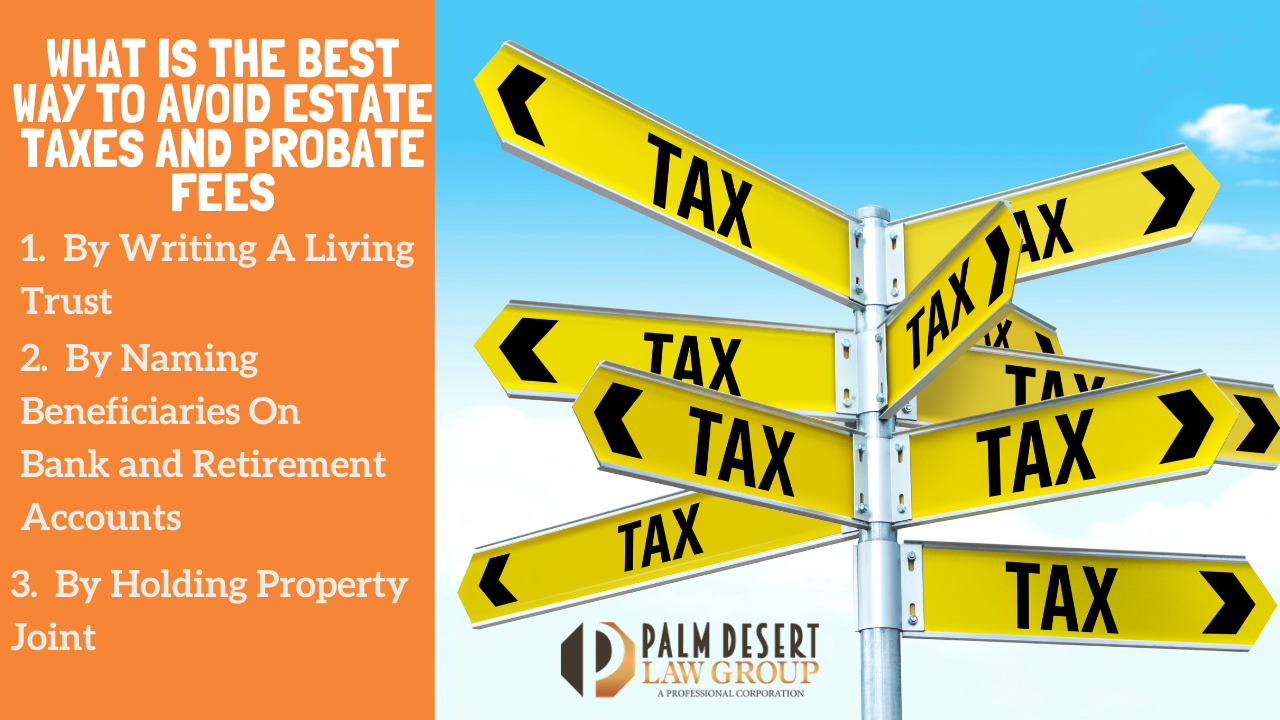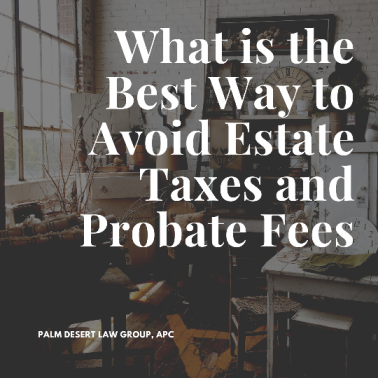We are all going to reach that point where everything we have built and acquired over our lifetimes will be passed to our loved ones and the next generation. As this occurs, your estate can experience unnecessary expenses, leaving your family with less than you would want for them. Is there a way to reduce or eliminate these fees? In this week's Estate Planning Tips with Pantea Fozouni, of Palm Desert Law, she answers these very questions and provides some tips on how to make sure you protect your family by planning now.
View the whole series - This is Part 4
Part 1 of this series? Click here to watch now
Part 2 of this series? Click here to watch now
Part 3 of this series? Click here to watch now
What is the Best Way to Avoid Estate Taxes and Probate Fees
There’s nothing quite like the feeling of watching your loved ones be happy. That’s exactly why we work hard and save, to make everything easier for those people in your life.
But then the government steps in. And no one wants to spend the better half of their sweat and blood to the government because of probate fees. Neither would anyone appreciate the fact that their loved ones have to wait years to receive a dime of your hard-earned money.
Sounds like a right bummer, no? Worried that you’re wasting your life away for nothing? Wondering how you can avoid being in that situation? Worry not. That’s what we’re going to be talking about here! Ready? Let’s start at the top!
But Wait, What Are Estate Taxes?
So you want to avoid estate taxes, but here’s a question: do you really know what these are? No? Then allow us to enlighten you!
Slightly different to probate expenses, estate taxes are bonus points in said probate expenses. But here’s the thing: you can avoid these through several different tricks.
Moreover, these federal estate taxes are super expensive, going up as much as 45 to 55%. What’s more? You need to pay them in cash, typically nine months after your death.
So Who Has To Pay Them?
Now that you know what estate taxes are exactly, it’s time to understand who pays them.
Typically, federal estate taxes only apply to people if the net value of their estate is higher than the Congress-set value. For example, the federal exemption was $5 million in 2011 and 2012, and the tax rate was 35%. Without the action of Congress, it would have turned to $1 million by the end of 2012. Plus, the tax rate would reach 55%.
A few exceptions in certain states include having their own death or inheritance taxes, thus exempting you from federal tax.
And How Is My Estate’s Net Value Determined?
I know what you’re thinking: Alright, so how do I know what my estate’s net value is and if it’s increased? Sit back and relax! We have the answers to that as well.
To calculate the current net value of your estate, you need to first get a calculator. Start by generating a sum of your assets. Then, take away your debts. Once that’s done, include your retirement plans, home, IRAs, business interests, personal property, bank accounts, investments, and death benefits to your life insurance. This way, you’ll arrive at what your estate’s net value is exactly!
How Do I Avoid These?
Now that we’ve chalked down the basics, let’s hop onto the next most essential question; how can you avoid these? Well, that’s exactly what we’ve discussed below! Keep scrolling to read them!

1. By Writing A Living Trust
The easiest way to avoid overthinking probate and estate taxes is to write a living trust. What’s that? You ask.
In simple words, it acts as an alternative to your last will. However, there are several differences between the two as well. Where a will distributes your assets on you dying, a living trust puts your assets in the trust. A trustee then manages them for the benefit of whomever your beneficiaries are.
Moreover, a will consists of unnecessary court fees, derived from the gross estate. The drawback is that this fee can sometimes be as much as ten percent of your estate’s total. While this money can help pay burial expenses and trustee fees, these are lost in passing the will.
That’s where a living trust comes in the picture. When you write a living trust, you can avoid all kinds of probate fees since your property or assets are distributed to the trust.
2. By Naming Beneficiaries On Bank and Retirement Accounts
Moving on to the next problem, so what if you think a will is better than a living trust because it sounds more straightforward? Well, lucky for you, a written will doesn’t mean probate fees.
Yep, you heard that right! You can have a will and don’t have to pay probate fees. Often, people fail to realize that you can name beneficiaries to your most prized assets. Actually, we’re pretty sure you didn’t know that when you first opened a bank account, it allowed you to designate a beneficiary payable on death.
Shocked? Well, there’s more! Despite sounding like a piece of cake, the majority of the people don’t name their beneficiaries for their retirement plans, investment plans, and bank accounts. Furthermore, your 401K plans, pension plans, life insurance policies, IRA accounts, stocks, and bonds are all payable on death.
You only have to do one simple thing: request a payable on death form from your brokerage company or bank and then fill it out. One thing to keep in mind is, if you’re married, these accounts may be partially owned by your spouse.
On the other hand, filling these forms ensures your proceeds are dispersed at death immediately without the hassle of going through probate.
3. By Holding Property Joint
The last, super-easy way to ensure your estate stays far away from probate is to get a property joint. Not sure what we’re talking about? Allow us to elaborate.
Picture this: you and your spouse are deciding to purchase a new home unaware of probates and how difficult they will be to deal with later. But that’s what we’re here to save you from! By owning a said house jointly, your property will automatically be passed to the other without the involvement of probate.
No matter if you’re married to the person you jointly own a property, it will be passed down to the other person on one’s death. However, you will have to make sure you’ve designated the ownership clearly. This means looking into designating a co-owned property as community property and understanding what all this is exactly.
Besides this, several states include expedited probate for small estates. You can easily find out what your state regards a small estate as by reading the state's law. Pretty easy, no?
If you're not sure you've done all you can to avoid or eliminate fees and taxes, when that time comes, call Pantea today, and let her review what you have and make the changes...for total peace of mind. Call today 760-674-7175 or email - info@palmdesertlaw.comWe offer a complete spectrum of legal services for business owners and can help you make the wisest choices on how to deal with your business throughout life and in the event of your death. We also offer you a LIFT Your Life And Business Planning Session, which includes a review of all the legal, insurance, financial, and tax systems you need for your business. Schedule online today.





